24 Solo premieres in Monterey
Chris Eatough went into the 2006 season with one primary competitive goal: to win his seventh...
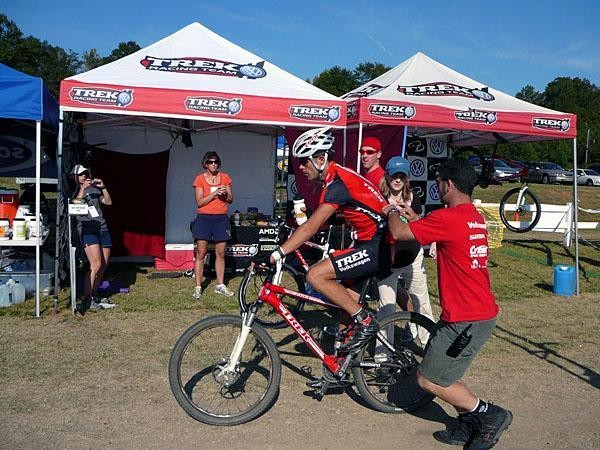
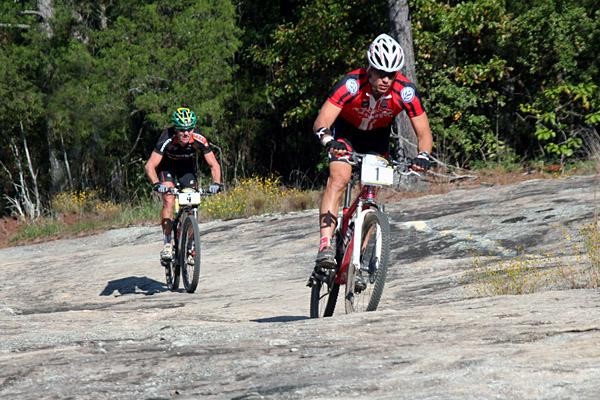
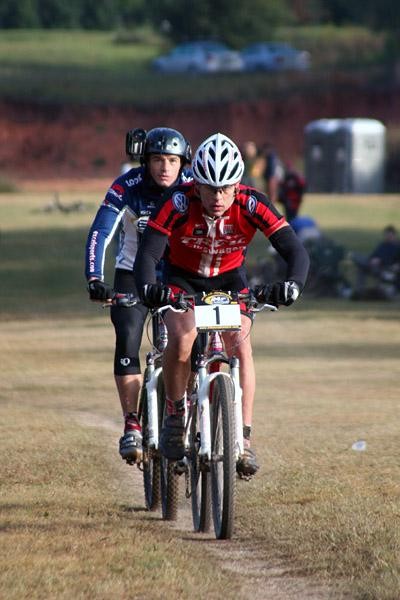
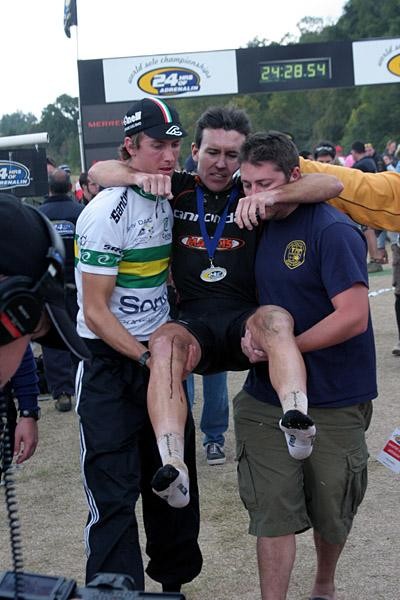
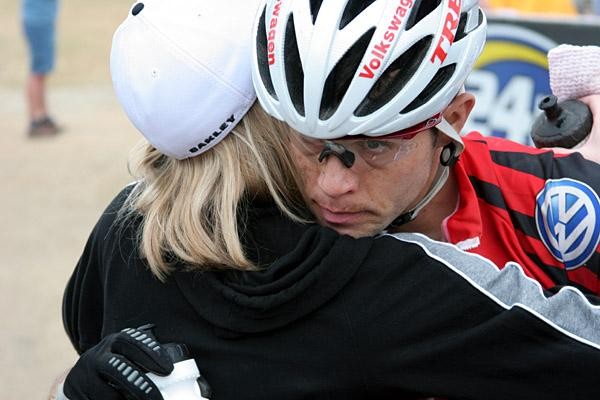





April 27, 2007
Film captures two-man battle for title
24 Solo, a movie that documents Chris Eatough's quest for a seventh consecutive 24 hour world solo mountain bike title, made its world premiere at the Golden State theatre in downtown Monterey, California, one evening during the Sea Otter Classic. On hand were many of the stars from the film and a list of guests that read like the who's who of American mountain biking. Cyclingnews' Sue George was there to review the movie and talk to producer Ken Bell and newly-made movie star Eatough.
Chris Eatough went into the 2006 season with one primary competitive goal: to win his seventh consecutive 24 Hours of Adrenaline World Solo Championships. 24 Solo captures what ultimately becomes a two-man battle between Eatough (Trek / VW) and Craig Gordon (Cannondale) for the title in Conyers, Georgia, in October 2006. The movie was produced by Ken Bell and directed and written by Jason Berry, the same two men from Gripped Films, who were behind Off Road to Athens, a documentary of eight racers' bids to make the 2004 US Olympic team.
Besides the battle for the title, the movie focuses on the relationship between Eatough and his logistics coordinator, Jon Posner, before, during, and after the race. Along the way, viewers learn, in documentary-style, about the logistics involved in supporting a 24 hour racer and the effect of such an effort on key supporters and family members.
The film contains a mix of personal interviews and footage of Eatough and others training on the road and trail and racing off-road. If the images of the riders flowing fast on tight, wooded singletrack don't make you want to pump your tires and head for the woods, the footage of Eatough training on quiet, winding, rolling Maryland back roads will make you want to pull out your road bike and head for the countryside.
The movie opens with Eatough racing at the US National 24 hour solo championship in Wisconsin. His opening quote foreshadows the personal struggles seen later in the movie: "There's no hiding in a 24 hour race. You come face to face with your soul." Eatough and Gordon get to do just that.
Get The Leadout Newsletter
The latest race content, interviews, features, reviews and expert buying guides, direct to your inbox!
In between the national championship race and the world championship race, Eatough and some of his crew travel to China for a marathon cross country race. The foreign footage provides plenty of eye candy in the form of spectacular scenery, intense colors and a glimpse into Chinese culture, although it adds little to the overall plot.
Racing action at Worlds is thoroughly captured by three cameras on the ground and two on helmets. Some is recorded by cameramen roped to zip lines strung between trees. As the racers pass, the camera moves with them, enabling them to catch more with each pass. Other on-bike footage is captured by Nick Alexander, a long-time friend of Director Berry's, as folows Gordon and Eatough during the big day. Watching Alexander struggle to keep up gives the viewer a sense of just how fast and skilled Eatough and Gordon are on their bikes.
24 Solo shows the human side of racing endurance events. While racers compete against each other for podium spots, they find their toughest competitor within, and the 24 hour race often comes down to a battle of mental toughness. Who can push the hardest? As John Stamstead, father of 24 hour solo mountain biking, summarized the effort, "You have to fight your normal biology. You're doing something other than what your body is set up for."
Before the race even starts, a few interviews with key American competitors make it clear that the race among them is for second. Most are obviously intimidated by Eatough's reputation and winning record. It takes someone like Australian Craig Gordon, who's only heard of Eatough and never raced him, to win the first mental battle of the racing - thinking he has a real chance to win the title.
The race is punctuated by short interviews with Stamstead and top cross country current and retired pros like Alison Dunlap, Travis Brown, and Nat Ross. Dunlap underscored the effort required, "The sport (referring to 24 hour solo races) is so hard, no one could pay you enough to motivate you to do it." The motivation must come from within.
Besides the excellent racing and riding footage, one of the strengths of the film is its many bits of humor interspersed with moments of seriousness. The underlying positive dispositions of Eatough and Posner emerge in these moments, and you can tell how much they respect each other. Throughout, the athletes and crew keep an amazing perspective despite the pressure and difficulty.
Eatough has a reputation for his attention to detail, perhaps due in part to his engineering education, and his meticulousness shows - in all six world championship rides, he has had only one mechanical, a single flat tire. While in the early years, he handled most of his own logistics, others now cover many of the details. Yet even the sometimes machine-like Eatough can make mistakes in his calculations. At one point, with his vision failing in one eye mid-way through the championship race, his lap times slow more than expected and he runs out of battery power for his lights .
Watching Gordon finish the race is a little like watching Paula Newby Fraser finish the 1988 Ironman in Hawaii. Their bodies are shutting down. You want to step into the scene and help him get his suffering over with more quickly. Gordon is so incoherent at the end of the race that he is unable to speak intelligently.
24 Solo is a more mature production than Gripped Film's previous movie, Off Road to Athens. It goes deeper into the main characters' personalities and struggles, in part because there are fewer main characters, but Berry and Bell are also clearly continuing to improve their skills with additional writing and production experience over time.
Where 24 Solo falls short is in setting the context for the battle. While non-cycling viewers may enjoy the action shots and the sense of drama between two protagonists, what Eatough is trying to accomplish is not put into full context and may well be lost on those who are not endurance mountain biking fans or who have not followed Eatough's career. That said, the plot overall is much less complex that Off Road to Athens, and even those not experienced in cycling will be able to comprehend the two main plot lines: a documentary of a friendship between two men and a battle between two other men.
Perhaps the other area that could have been improved was the interviews with Gordon. All conversations with him are retrospective conducted from his hospital bed after the race. What is missing are interviews with him before the race or several months afterward. Realistically, logistics and budget probably limited opportunities for the US-based production crew to interview the Australian.
Behind the scenes
"The movie came about after Off Road to Athens showed in Baltimore," said producer Ken Bell. "Being local to Chris, he came for the showing. He and Jason started talking. It seemed like Chris' quest for another title would be a compelling story. Off Road proved that people are interested in story-driven cycling films."
"Every aspect other than staying up all night two nights to film was easier this time," said Bell. He had support from Trek, VW, and Nike, and "We only went to three races, so there was much less travel."
The entire movie was shot in high definition video, still a relatively new and therefore sometimes painful medium. "We were on the bleeding edge of high def. It was challenging, but some of the pictures we got were amazing." Even the helmet cam shot high definition footage.
Bell drew upon college roommate Haik Naltchayan to produce the soundtrack for 24 Solo. His music captures the sense of pounding and emotion of the racers and will have you tapping your toes or tensing up with suspense. The 47 tries it took for Naltchayan to get the music right for scene one paid off - he sets the tone well for the rest of the film.
When asked about the future movies, Bell was non-committal, "I've got no other projects in mind now. It's not a nine-to-five job. It's working from 9 am to 3 or 4 am the next morning, then sleeping for a few hours and repeating over and over again. We probably had over 100 hours of tape. It takes so long to go through all that and craft the story together." Bell said he is ready to spend more time with his family.
More 24 hour racing for Eatough
Although the film may make some viewers vow to never do a solo 24 hour race, Eatough himself is ready for more.
It seems likely he will try again for a seventh title at the 2007 24 hours of Adrenaline World Championships, this year to be held in Monterey, California, in the fall, but in the meantime, "I'm taking it one race at a time. The next big one [2007 nationals - ed.] is in Wisconsin. I'm focusing on that for now," said Eatough, fresh off a victory at the Cohutta 100 miler, the first National Ultra Endurance (NUE) series event in Tennessee. Eatough hopes to do enough NUE races to qualify for the series overall even if his 24 hour solo race schedule prevents him from doing them all.
Most cyclists never have a chance to be movie stars, but Eatough adapted to his new role well. He and his wife Alison got a red carpet welcome into the theatre on preview night, but nothing really prepares a person for seeing himself on the big screen.
"It was a strange experience. It was something I appreciate and enjoy because it's so unique, but it's definitely something I'm not used to," said Eatough.
"The movie was real. It was how it went down. I don't think they missed anything from the race." Eatough has had plenty of time to reflect on his experience. "Obviously I've gone over things many times myself already. It didn't affect me too much to see it on the screen."
It may not affect Eatough, but 24 Solo gives viewers a true appreciation of what it takes to race a 24 hour solo event.